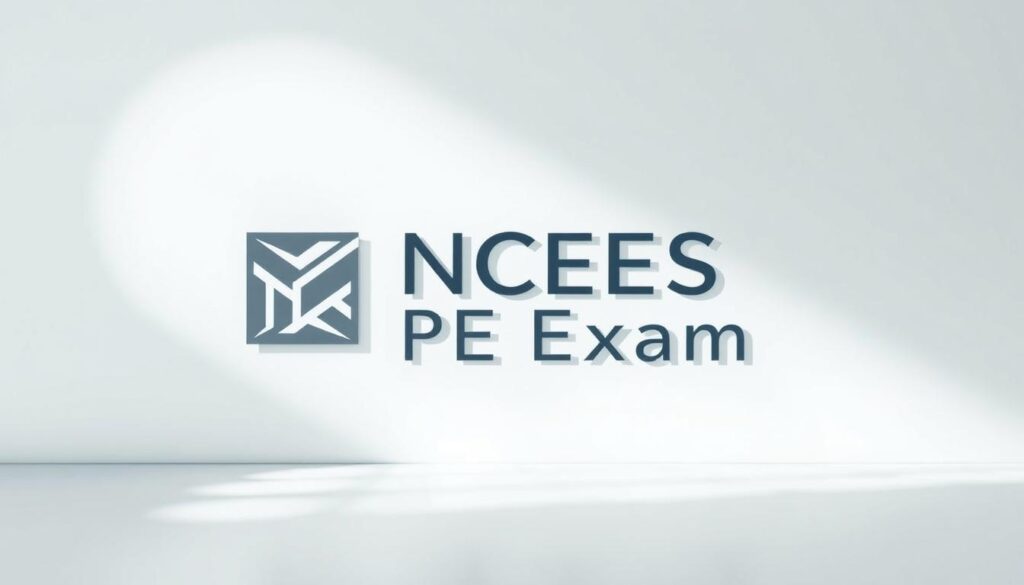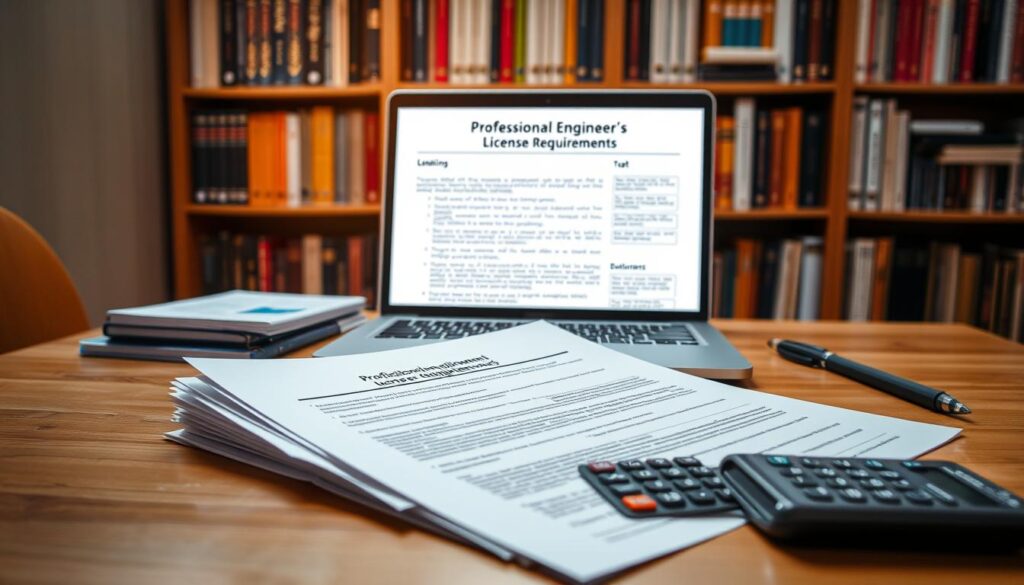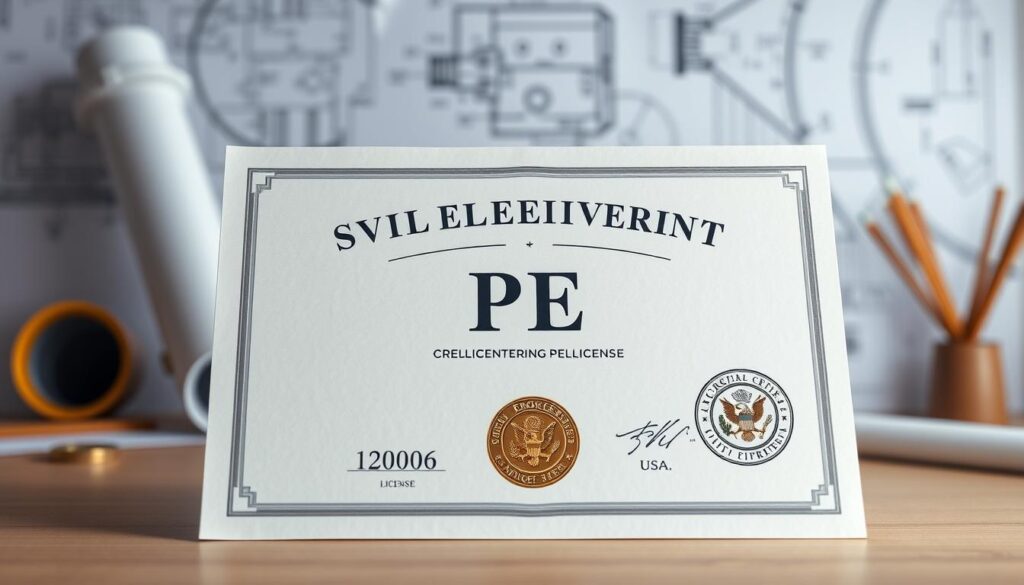Are you a civil engineer looking to advance your career? Obtaining a Professional Engineer (PE) license is a significant milestone that not only enhances your career prospects but also signifies your expertise and commitment to the field.
The process involves meeting specific educational, experience, and examination requirements, which vary by state. Understanding these licensure requirements is crucial for navigating the process successfully.
Key Takeaways
- Educational requirements for a PE license vary by state.
- Gaining relevant work experience is essential.
- Passing the PE exam is a critical step.
- Licensure requirements differ across the United States.
- A PE license enhances career prospects and signifies expertise.
Overview of the PE License in Civil Engineering
For civil engineers, acquiring a PE license is a key step towards achieving professional maturity and independence in their field. This certification is a mark of excellence, indicating that an engineer has met rigorous standards in education, experience, and examination.
What is a Civil Engineering PE License?
A Civil Engineering PE license is a certification that allows engineers to sign off on projects, work independently, and take on more complex and high-level responsibilities. It signifies that the engineer has demonstrated the necessary knowledge, skills, and judgment to practice safely and competently.
Importance of the PE License
The PE license is essential for career advancement in civil engineering. It is often required for senior roles or for working on projects that impact public safety. Having a PE license can significantly enhance an engineer’s career prospects and earning potential. It also demonstrates a commitment to staying updated with the latest developments and best practices in the field.
By obtaining a PE license, civil engineers can expand their professional opportunities, take on leadership roles, and contribute to the development of safe and innovative infrastructure projects. The licensure process involves a combination of education, experience, and passing the PE exam, ensuring that licensed engineers are fully equipped to meet the challenges of their profession.
Educational Requirements
Understanding the educational requirements is essential for aspiring civil engineers seeking licensure. The foundation of a successful career in civil engineering is built on a strong educational background.
The primary educational requirement for a Civil Engineering PE License is graduating from an Accreditation Board for Engineering and Technology (ABET)-accredited program. These programs are designed to provide a comprehensive education in engineering principles, mathematics, and science, preparing students for the Fundamentals of Engineering (FE) exam and subsequent professional practice.
Accredited Degree Programs
ABET-accredited programs are crucial for ensuring that graduates have the necessary knowledge and skills to succeed in their careers. The curriculum in these programs covers a wide range of topics relevant to civil engineering, including structural analysis, hydraulics, and geotechnical engineering.
| Program Aspect | Description | Relevance to PE Exam |
|---|---|---|
| Curriculum | Covers fundamental engineering principles, mathematics, and science | High |
| Faculty Expertise | Professors with industry experience and advanced degrees | Medium |
| Facilities and Resources | State-of-the-art labs and equipment for hands-on learning | High |
Non-accredited Degree Considerations
For individuals who graduate from non-accredited degree programs, additional steps may be required to meet state-specific educational requirements for the PE license. This might include completing additional coursework or verifying the degree through a credential evaluation service.
Key Considerations:
- Research state-specific requirements for PE licensure
- Understand the need for additional coursework or degree verification
- Prepare for potential additional educational requirements

By understanding the educational requirements and choosing the right academic path, aspiring civil engineers can set themselves up for success in their careers and be well-prepared for the PE exam for civil engineers.
Experience Requirements
Gaining relevant work experience is a crucial step in becoming a licensed civil engineer. After passing the FE exam, aspiring PEs must accumulate significant work experience under the supervision of a licensed professional engineer. This experience is vital for developing the practical skills and judgment needed for independent practice.
Required Work Experience Duration
The duration of work experience required for a PE license varies by state, but it typically involves a minimum of four years of progressive experience. This experience should be diverse and relevant to the engineer’s field of practice. It’s essential to check with your state’s licensing board for specific requirements, as some may have additional or different criteria.
Progressive experience means that the work experience should demonstrate a progression of responsibility and complexity over time. Engineers should ensure that their experience is well-documented, as it will be a critical component of their PE license application.
Types of Accepted Work Experience
The types of work experience accepted for PE licensure can vary, but generally, they include experience in design, construction, and management. Experience in a consulting or government role can also be relevant. It’s crucial to gain experience in areas that are relevant to your desired field of practice.
- Design experience: Involves creating plans and specifications for infrastructure projects.
- Construction experience: Involves overseeing the construction of projects.
- Management experience: Involves managing teams, projects, or departments within an organization.
By gaining a diverse range of experiences, engineers can develop a comprehensive understanding of their field and be better prepared for the responsibilities of a licensed PE.
Examination Requirements
The licensure process for Civil Engineers requires passing two significant exams administered by the National Council of Examiners for Engineering and Surveying (NCEES). These exams are crucial milestones in the journey to becoming a licensed Professional Engineer (PE).
Overview of the FE Exam
The Fundamentals of Engineering (FE) exam is typically taken during the final year of undergraduate study or soon after graduation. It is designed to test a candidate’s knowledge in their specific engineering discipline. The FE exam is a computer-based test that covers a broad range of topics, including mathematics, engineering principles, and problem-solving skills.

Overview of the PE Exam
After gaining sufficient work experience, candidates can take the Principles and Practice of Engineering (PE) exam. This exam assesses a candidate’s ability to apply engineering principles and practices to real-world problems. The PE exam is also administered by NCEES and is discipline-specific, allowing candidates to demonstrate their expertise in Civil Engineering.
The NCEES PE exam is a critical step in the licensure process, as it validates a candidate’s competence and readiness to practice as a licensed Professional Engineer. By passing these exams, engineers demonstrate their commitment to upholding the standards of their profession and ensuring public safety.
Application Process
The application process for a Civil Engineering PE license is a detailed procedure that requires attention to state-specific requirements. To become a licensed Professional Engineer, one must submit an application to the state’s engineering licensure board, ensuring all required documentation is in order.
Steps to Apply for the PE License
To successfully apply for a PE license, follow these steps:
- Step 1: Gather all necessary documents, including transcripts and experience verification.
- Step 2: Fill out the application form provided by your state’s licensure board.
- Step 3: Submit the application along with the required fees.
- Step 4: Wait for the board to review your application and verify your credentials.
Required Documentation
The documentation required for a PE license application typically includes:
- Official transcripts from accredited degree programs.
- Verification of work experience, which may involve employer verification.
- Exam scores, particularly for the FE and PE exams.
It’s crucial to check with your state’s licensure board for specific requirements, as these can vary significantly.
State-Specific Requirements
While the NCEES provides a general framework for PE licensure, individual states have their own set of rules and regulations. This variability means that civil engineers must be diligent in understanding the specific requirements for the state in which they wish to be licensed.
Variations by State
The requirements for obtaining a PE license in civil engineering can differ significantly from one state to another. For instance, some states may require additional certifications or exams beyond the standard PE exam. Engineers should be prepared to meet these state-specific demands.
State licensure boards are responsible for setting these requirements, which can include specific coursework, experience, or examination requirements. It’s crucial for aspiring PEs to research these requirements thoroughly.

Researching Your State’s Requirements
To navigate these variations, engineers should start by visiting their state’s licensure board website. Here, they can find detailed information on the specific requirements for obtaining a PE license in civil engineering within their state.
- Review the state’s application process and required documentation.
- Understand any additional exams or certifications needed.
- Familiarize yourself with the state’s continuing education requirements for license renewal.
By taking these steps, civil engineers can ensure they are well-prepared to meet their state’s specific requirements, paving the way for a successful PE licensure application.
Preparing for the PE Exam
The path to acing the PE exam begins with a thoughtful preparation strategy. Preparing for the PE exam is a multifaceted process that involves understanding the exam format, selecting the right study materials, and practicing with sample questions.
Recommended Study Resources
To prepare effectively for the PE exam, it’s crucial to utilize a variety of study resources. Review courses are highly recommended as they provide structured learning and cover the exam syllabus comprehensively. Additionally, practice exams are invaluable for assessing your knowledge and familiarizing yourself with the exam format.
Some other beneficial resources include study groups, where you can collaborate with peers, and online forums, where you can discuss challenging topics and share resources. It’s also advisable to use official study materials provided by the exam administrators, as they offer the most accurate representation of the exam content.
- Review courses
- Practice exams
- Study groups
- Online forums
- Official study materials
Tips for Exam Day
On the day of the exam, being well-prepared is key to success. Ensure you arrive early at the exam venue, bringing all required documents and materials. Time management is crucial; allocate your time wisely across all sections of the exam to avoid last-minute rushes.
It’s also important to stay calm and focused. Take deep breaths if needed, and read each question carefully before answering. Understanding the exam format and the types of questions asked will also help in managing your time effectively.
- Arrive early at the exam venue.
- Bring all required documents and materials.
- Manage your time effectively across all exam sections.
By combining thorough preparation with strategic exam-day tactics, you can enhance your chances of passing the PE exam and obtaining your civil engineering PE license in the USA.
Maintaining Your PE License
To keep your PE license active, it’s essential to understand the continuing education requirements and the renewal process. Maintaining your licensure not only enhances your professional credibility but also ensures compliance with state regulations.
Continuing Education Requirements
Continuing education is a critical component of maintaining your PE license. It involves completing a specified number of professional development hours (PDHs) or continuing education units (CEUs) within a certain period, typically every two to four years. These courses help you stay updated with the latest advancements in civil engineering, including new technologies, methodologies, and regulatory changes.
Key aspects of continuing education include:
- Ensuring the courses are relevant to your field of practice.
- Verifying that the course providers are approved by your state’s licensing board.
- Maintaining detailed records of your completed courses.
| State | Continuing Education Requirement | Renewal Period |
|---|---|---|
| California | 30 hours | 2 years |
| New York | 36 hours | 3 years |
| Texas | 30 hours | 2 years |
License Renewal Process
The license renewal process typically involves submitting proof of completed continuing education requirements and paying a renewal fee to your state’s licensing board. It’s crucial to initiate the renewal process well in advance of your license expiration date to avoid any lapse in licensure.
Steps to renew your license:
- Gather documentation of your continuing education credits.
- Complete the renewal application provided by your state’s licensing board.
- Submit the application along with the required fee.
- Ensure you receive confirmation of your renewed license.

By staying informed about the continuing education requirements and license renewal process, you can maintain your PE license efficiently and continue to practice as a licensed professional engineer.
License Fees and Costs
License fees and associated costs are crucial factors for civil engineers aiming to acquire a PE license. Understanding these expenses is essential for budgeting and planning throughout the licensure process.
Breakdown of Application Fees
The application process for a PE license involves several fees. The primary cost is the application fee itself, which varies by state. Additionally, engineers must pay for the NCEES PE exam, which is a standardized test used across the United States.
| Fee Type | Average Cost | Notes |
|---|---|---|
| Application Fee | $100 – $500 | Varied by state licensing board |
| NCEES PE Exam Fee | $200 – $300 | Standardized fee for the exam |
| Licensure Fee | $100 – $300 | Initial licensure fee upon approval |
Other Related Costs
Beyond the direct application and exam fees, civil engineers should also consider other expenses associated with obtaining a PE license. These include costs for study materials, review courses, and potentially, travel to exam centers.
- Study Materials: Review books, online courses, and practice exams can range from $50 to $500.
- Review Courses: Formal review courses can cost between $200 to $1,000.
- Travel and Accommodation: Costs vary depending on the location of the exam center.
It’s essential to factor these costs into your overall budget to ensure a smooth licensure process.
By understanding the full scope of costs involved, aspiring licensed civil engineers can better prepare financially for the steps to become a licensed civil engineer, including the NCEES PE exam.
Benefits of Having a PE License
Acquiring a PE license in civil engineering is a significant step that brings numerous benefits to professionals in this field. One of the primary advantages is the enhancement of career prospects.
Career Advancement Opportunities
A PE license opens up new avenues for career advancement. Licensed engineers can take on more complex projects, work independently, and move into senior roles within their organizations. This credential is often a prerequisite for leadership positions and can significantly boost one’s career trajectory.
Key Career Advancement Opportunities:
- Leadership roles in projects
- Increased responsibility and autonomy
- Eligibility for senior positions
- Opportunities for specialization
Improved Earning Potential
Having a PE license typically results in improved earning potential. Licensed engineers are often compensated at a higher rate than their unlicensed counterparts. This is because a PE license demonstrates a level of expertise and commitment to the profession.
| Experience Level | Average Salary (Unlicensed) | Average Salary (Licensed) |
|---|---|---|
| Entry-Level | $60,000 | $70,000 |
| Mid-Level | $80,000 | $100,000 |
| Senior-Level | $100,000 | $120,000+ |
The salary figures are approximate and can vary based on factors like location, industry, and specific employer.

In conclusion, obtaining a PE license in civil engineering not only enhances career prospects but also leads to improved earning potential. It’s a valuable credential that can significantly impact a professional’s trajectory in the field.
Challenges in Obtaining a PE License
The journey to becoming a licensed Professional Engineer in civil engineering is fraught with obstacles. Aspiring engineers must navigate through a complex licensure process that includes meeting specific educational requirements, gaining sufficient work experience, and passing rigorous examinations.
Common Hurdles and Solutions
One of the primary challenges is meeting the state-specific requirements for licensure. These can vary significantly, making it crucial for applicants to research and understand the specific regulations in the state where they wish to practice.
- Varied State Requirements: Understand the specific requirements for the state where you wish to be licensed.
- Gaining Sufficient Experience: Seek mentorship and diverse project experiences to fulfill the experience requirements.
- Exam Preparation: Utilize recommended study resources and practice exams to prepare for the PE exam.
Developing a structured study plan and seeking support from peers and mentors can significantly mitigate these challenges. Staying organized and focused is key to successfully navigating the licensure process.
| Challenge | Solution |
|---|---|
| State-specific requirements | Research state’s PE license requirements |
| Gaining sufficient work experience | Seek diverse project experiences and mentorship |
| Exam stress and preparation | Develop a study plan, use recommended study resources |
Managing Study and Exam Stress
Managing stress during the study and exam process is crucial for success. Effective time management, regular breaks, and maintaining a healthy lifestyle can help mitigate exam-related stress.
Tips for Managing Exam Stress:
- Create a detailed study plan and stick to it.
- Practice with sample questions and past exams.
- Join a study group or find a study buddy for support.
- Ensure adequate rest and maintain a healthy diet.
By understanding the challenges and implementing effective strategies, aspiring civil engineers can successfully navigate the PE licensure process and achieve their professional goals.
Resources for Aspiring Engineers
To aid in their professional development, aspiring engineers have access to a range of valuable resources. These resources not only provide essential information but also offer networking opportunities that are crucial throughout the licensure process.
Professional Organizations and Societies
Professional organizations and societies play a vital role in the development of aspiring engineers. They offer various benefits, including:
- Access to industry publications and research
- Opportunities for networking with experienced professionals
- Continuing education programs tailored to the needs of engineers
- Conferences and seminars that keep members updated on the latest industry trends
Some notable organizations include the American Society of Civil Engineers (ASCE) and the National Society of Professional Engineers (NSPE). These organizations are dedicated to supporting engineers through their careers.

Online Forums and Community Support
Online forums and community support are invaluable for aspiring engineers. They provide a platform for discussion, advice, and guidance. Some popular online resources include:
- Reddit forums dedicated to engineering and licensure
- Online study groups for the PE exam
- Professional networking sites like LinkedIn, where engineers can connect and share experiences
Engaging with these communities can help engineers stay informed and motivated throughout their journey to becoming a licensed professional engineer.
By leveraging these resources, aspiring engineers can better navigate the professional engineer license requirements and prepare effectively for the PE exam for civil engineers.
Conclusion
Obtaining a Civil Engineering PE license in the USA is a significant career milestone that requires careful planning and execution. By understanding the steps to become a licensed civil engineer, aspiring engineers can navigate the licensure process with confidence.
Key Takeaways
The journey to obtaining a PE license involves meeting specific educational, experience, and examination requirements. Engineers must secure an accredited degree, gain relevant work experience, and pass both the FE and PE exams. Familiarity with state-specific requirements is also crucial, as these can vary significantly.
Empowering Future Engineers
For those embarking on this journey, it’s essential to stay focused on the goal of obtaining a PE license in civil engineering. Utilizing recommended study resources, joining professional organizations, and leveraging online forums can provide valuable support. By following these steps and staying committed, engineers can enhance their professional credibility and unlock new career opportunities.

Pingback: Ace the PE Civil Exam: Tips and Strategies
Pingback: Ace the PE Civil Exam: Top Prep Tips